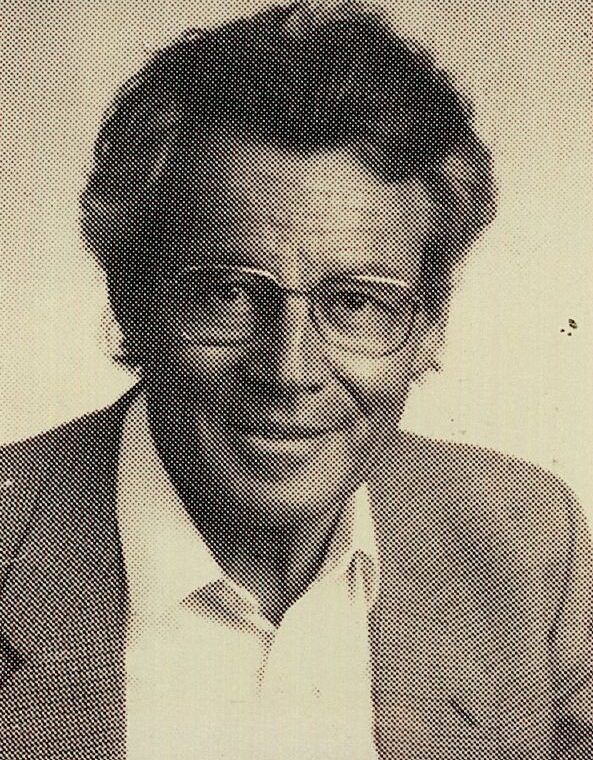Jean Vallat
A person who set out to ask the right questions
When former fellow students ask me what I remember of ETH, I generally say: “interdisciplinary thought and action”. And when they ask me how I came to learn that at ETH, of all places – the epitome of a technical university – there’s precisely one name and one role model to mention: Jean Vallat. This astonishing Professor of Agricultural Business Operations could not have been further from the cliché of an ETH technocrat. Memories of Michael Kaufmann.
Jean Vallat liked to reflect on things, and he expected that we, as students, would also reflect on things and question them. Alongside all the agricultural knowledge and the practical knowledge of real agricultural bureaucracy that formed part of our course, he required us also to keep an eye on the worlds of philosophy and politics. This meant that he would make excursive comments and remarks on agricultural events and contemporary goings-on in the middle of lectures on the dry subject of agricultural bookkeeping.
An uncomfortable fantasist with a critical gaze
Jean Vallat didn’t care about being comfortable. Colleagues and students alike would sometimes laugh at him, or brand him as disreputable or a fantasist – as happens to so many people who ask the right questions at the wrong moment. In any case that’s what comes to my mind whenever I think about that long-gone time and about Jean Vallat, who not only supported the open seminars we organised on developing countries, commodity trading, energy and the environment, unlike other lecturers, but also actively attended them and engaged in the discussion.

Land speculation, village princes and building plot farmers
It’s therefore no coincidence that, despite my degree focusing on plant cultivation, I was allowed to write my final diploma thesis on land trading in the municipality of Worb, near Bern. Jean Vallat, the Professor of Business Operations, had used the example of the Valais to show how entire rural areas in Switzerland had turned into agglomeration settlements during the boom of the 1960s, using the unflattering term “land speculation” to describe this. This led to the best agricultural land, and nature too, being sacrificed, and immense sums of money from the sale of land being siphoned off by a few “village princes” and “building plot farmers”.
We then encountered these socio-economic connections for ourselves in our research in the up-and-coming Bernese suburb of Worb. Within twenty years, the residential population had doubled, with average land prices increasing tenfold, while one staid farm after another quietly disappeared under the concrete.
And what about today?
These experiences initially had a direct impact on the next steps in my life: in 1979, Jean Vallat introduced us to Oliver Delafontaine, a rebellious farmer from Vaud. Back then, he was gathering signatures for his popular initiative to support the reform of farming land and to combat speculation, leading to the creation of a small Swiss-German group to support this (ultimately futile) endeavour. A year after the collection of signatures failed, the “city-countryside initiative against land speculation” came into being. It saw broad-based support in rural circles, from smallholders’ movements which also came into being in this era, from organic farmers, from the Greens and from left-leaning parties. The initiative met with failure in the popular vote in 1988, with almost 70 percent voting against it, but it did trigger some reforms in rural land and spatial planning law, which somewhat softened the blow of the loss of cultivated land.
This all happened shortly before Vallat retired and “retreated” to his beloved Valais. Our paths have not crossed afterwards, and yet, a good 30 years later, I can still remember Jean Vallat’s legacy: what has really changed since then in Swiss agricultural policy?
Driven by a desire to achieve the impossible
Indeed, Jean Vallat’s Schopenhauerian pessimism has been partly borne out in the age of direct payments with a subtle environmental focus: today, in 2021, the lively culture of rural life (and absolutely not just in the conservative sense!) continues to slip away. The world of consumerism serves us strawberries from southern Spain at Easter, the environmental and pesticide impact of intensive farming remains hefty, the organic boom (for all that it is mentioned) has still not got above the point of 10 percent of the market, the number of farmers and amount of agricultural land available continue to decline, while land prices continue to soar skywards.
“Professeur de philosophie appliqué”
Vallat took a cautious approach, and his horizons stretched far beyond merely technical knowledge or expertise in agricultural economics. The “professeur de philosophie appliqué”, as federal councillor and agricultural scientist Friedrich Traugott Wahlen fittingly called him, continued to ask uncomfortable questions, and sometimes deliver controversial answers, after his retirement and right up to his death in 2009. This was likely driven by his enduring hope of having an impact. For example, he published a text in the weekly paper “WoZ” in 2006 responding to the government’s concept of its Agricultural Policy 2011 (AP 2011), published a short while before. Vallat rejected it, saying: “Instead of this, we need to devote ourselves to the challenging, highly complex task of combating the simplicity of the economic model in vogue at the moment. It’s about developing agricultural policies on the basis of the conditions provided by nature. Economists have forgotten that agricultural production is dependent on nature, meaning that it is uneven.”
We can but hope that there are still brains akin to Jean Vallat’s playing their part in the Agricultural Sciences at ETH Zurich. Future generations of students, and not least our agricultural sector, will need this foresight and these links to society and the economy.